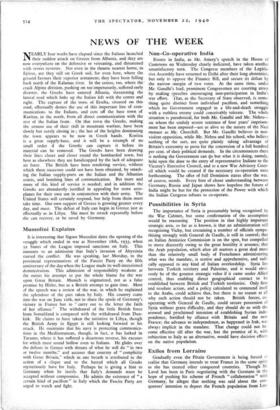Mussolini Explains
It is interesting that Signor Mussolini dates the opening of the struggle which ended in war at November 18th, 1935, when 52 States of the League imposed sanctions on Italy. This amounts to an admission that Italy's invasion of Abyssinia started the conflict. He was speaking, last Monday, to the provincial representatives of the Fascist Party on the fifth anniversary of the day when the League made its well-intentioned demonstration. This admission of responsibility weakens at the outset his attempt to put the whole blame for the war upon Great Britain. Munich is stigmatized, not as a false promise by Hitler, but as a British attempt to gain time. Most of the speech was a review of the war, in which he explained the splendour of the part taken by Italy. His country came into the war on June loth, not to share the spoils of Germany's victory in France but to carry out to the letter the faith of her alliance." The withdrawal of the little British force from Somaliland is compared with the withdrawal from Dun- kirk. He claims to have taken the initiative in Libya, though the British Army in Egypt is still looking forward to his attack. He maintains that his navy is protecting communica- tions in the Mediterranean, though, in fact, it has lurked in Taranto, where it has suffered a disastrous reverse, his excuses for which must sound hollow even to Italians. He glides over the defeats in Greece with threats of what he will do "in two or twelve months," and accuses that country of "complicity with Great Britain," which in one breath is attributed to the action of a clique and to the hatred which all Greeks mysteriously have for Italy. Perhaps he is giving a hint to Germany when he insists that Italy's demands must be accepted without compromise. He admits the existence of "a certain kind of pacifism" in Italy which the Fascist Party are urged to watch and fight.


























































 Previous page
Previous page